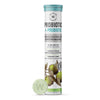We've all heard that dietary fiber is essential for maintaining a healthy gut microbiome, which influences your overall health and well-being. The tiny microorganisms that live in your gut will ensure that you don't gain or lose weight dramatically, that your immune system is functioning properly, and that you are protected from a variety of chronic life-threatening conditions. Chicory root is one such fiber-rich food that has long been used in traditional medicine but has now taken over the nutraceutical market and is a key ingredient in prebiotics and probiotic supplements. Continue reading to learn more about this root and its importance to overall health.
What is Chicory?
Chicory is a blue-colored perennial plant that is grown all over the world. All parts of the plant, particularly the root, have numerous health benefits. While the leaves and flowers of this plant can be added to salads, the roots are used to make food, beverages, livestock feed, and pet food.
It is a high-fiber, low-calorie, and low-fat food. Having chicory regularly can provide you with a plethora of vitamins and minerals like folate, potassium, phosphorus, and calcium, along with soluble fiber.
Inulin- The Prebiotic Fiber from Chicory Root
68% of chicory root is made up of inulin, a water-soluble fiber. Chicory provides many nutrients, but it has the highest concentration of inulin. This fiber passes through the small intestine and is then fermented in the large intestine by friendly gut bacteria. This inulin derived from chicory root aids in digestion and relieves constipation. Because prebiotic fiber can be used as a texture modifier, sweetener, and fat substitute, it is found in many packaged foods.
Health Benefits of Chicory Root
1. Improves Digestion:
Our gut is home to both good and bad bacteria. The good ones help us in the digestion process and also ensure that the quantity of bad ones remains under control. These good bacteria feed on certain fibers called prebiotics. Inulin happens to be one of them. The prebiotics not only feeds the good bacteria but also help them grow and multiply. The more we have them, the better our digestion.
2. Relieves Constipation:
Being a water-soluble prebiotic, chicory helps in providing bulk to stools and increasing their frequency of passage. Inulin in chicory also acts as a natural laxative.
3. Lowers Blood Cholesterol:
Soluble fibers tend to lower total blood cholesterol by lowering low-density lipoproteins (bad cholesterol). Thus, chicory may also help you manage your lipid levels (fatty compounds that perform a variety of functions in your body).
4. Lowers Blood Sugar Levels:
Eating high-fiber meals help lower post-meal blood sugar levels. Chicory root extract increases the levels of adiponectin, which helps in maintaining blood glucose levels and preventing or delaying the onset of type 2 diabetes.
5. Anti-Inflammatory:
Chicory is high in plant polyphenols, which are natural compounds that have anti-inflammatory properties. The root helps fight free radicals due to its antioxidant properties. i.e., it prevents cell damage in the body, thereby protecting major organs.
6. Supports Weight Loss:
It is a good source of oligofructose and inulin. Both are natural forms of dietary fiber, that tend to keep you full for a longer period of time, thereby preventing you from overeating. By aiding in portion control and calorie restriction, chicory root fiber aids in weight loss.
7. Table Sugar Alternative:
Inulin has replaced regular sugar in the food industry because it has fewer calories and does not raise blood sugar levels like table sugar. Many packaged foods contain high fructose corn syrup and table sugar, both of which are harmful if consumed in excess. Inulin derived from chicory root fiber may be a much better (though less sweet) alternative that not only reduces calories and sugar spikes but also aids digestion due to its prebiotic effect.
8. Coffee Substitute:
This root tastes similar to your daily cup of joe but without caffeine. No wonder it has become a highly sought-after ingredient to improve overall wellness. For some, a caffeine overdose can cause headaches, migraines, and blood pressure fluctuations. Furthermore, excessive caffeine consumption can cause nausea, anxiety, heart palpitations, restlessness, and insomnia. With chicory coffee, you get all the benefits without the caffeine crash.
Chicory in Supplements
Most of the packaged foods in the market claiming to be high-fiber foods would have inulin as their fiber source. And this inulin is extracted from none other than the chicory root fiber. Since this fiber has the ability to absorb moisture and swell up, it adds bulk to the product and also provides a creamy texture and a mild sweet taste. You would find chicory root fiber (inulin) most commonly in bread, breakfast cereals, protein bars, ice creams, chocolates, etc.
If you want to make this functional ingredient a part of your regime, you can also start taking prebiotic and probiotic supplements that have chicory root in the form of inulin as their high-fiber prebiotic component. These supplements come in various forms, like probiotic capsules, pills, and fizzy tabs.
Wrapping Up
When it comes to digestive health, prebiotics and probiotics go hand in hand. Chicory root fiber being prebiotic, promotes more probiotic production in the gut. More probiotics in the gut would mean better digestion. So don't shy away from adding chicory root to your daily diet. Remember that it's best to always consult your doctor before starting any new supplement.
References
Chicory: Does It Benefit Your Health? (webmd.com)
INULIN: Overview, Uses, Side Effects, Precautions, Interactions, Dosing, and Reviews (webmd.com)





























